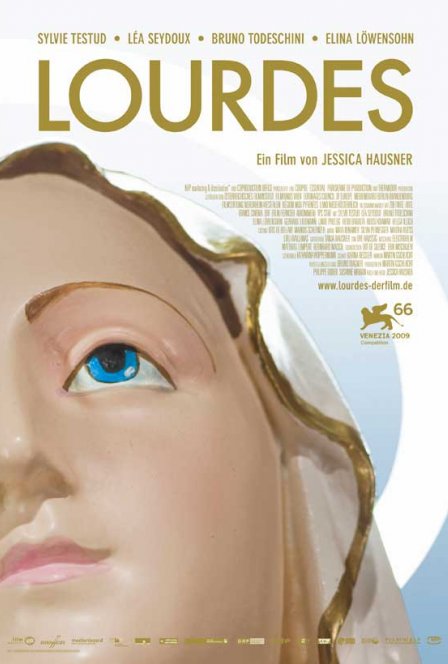Order and ritual form the questions and mysteries addressed in Lourdes, a French film about miracles and the problems and promises that they inspire. Directed by Austrian filmmaker Jessica Hausner, the film follows Christine (Sylvie Testud), a wheelchaired woman suffering from multiple sclerosis, who makes a trip to Lourdes (a commune in France) in hopes of regaining her health and mobility. Yet the pilgrimage offers her more of a chance to socialize rather than physical or spiritual salvation. To Christine, the young woman who tends to her exemplifies the sort of active and capricious life for which she longs and remembers. She is clearly looking more for human connection, not religious relationships. But when she miraculously rises from her wheelchair, the possibilities of freedom become heavy with unforeseen burdens and consequences.
Lourdes explores the personal and public landscapes of these miracles. Hausner’s use of place reveals a careful consideration of interior and exterior space. Shooting on location in the Pyrenees of southwestern France gives the cathedrals and grottos a visual heft, tethering the audience to the religious spectacle and power that can be attached to a place of such significance. At times, the film converts religious experience into a transaction not between man and God, but faith and capital. After arriving in Lourdes, Christine correctly remarks that it appears “a bit touristy.” This affect is exhibited repeatedly throughout the film through ritualistic repetition, the castle-like image of the Lourdes cathedral, and the achievement of the “Best Pilgrim” prize. The repeated use of blues, reds, and whites also indicate both a Catholic and French iconography further supported by the haunting and foreboding organ that echoes throughout the unseen and mysterious interior rooms of shrouded religious rites. These icons, both literal and figurative, inhabit the places of faith and reason, containing genuine (but also occasionally routine) significance.
Lourdes looks at and personalizes these problems that have instigated centuries of theological debate. Sometimes the questions are presented abstractly, other times directly. Consequently, when fellow pilgrims approach the priest with their concerns about God, faith, and miracles, his answers are simultaneously helpful and unfulfilling. This reanimates doubt and points to the difficult leaps that religion demands we make, a dissonance between faith and reason that is at the very heart of the film’s arguments: Is a miracle a product of “nature’s mysteries” as science explains them or of the world as God allegedly created it? The many rhetorical thinking points resonate wonderfully throughout Lourdes, constantly challenging with wit and curiosity the manifestations and issues regarding faith and the meaning of miracles.

